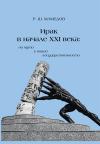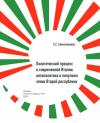2–3 февраля в Российском совете по международным делам в Москве проводится очередная встреча экспертов по международным вопросам, входящих в экспертную сеть ЕС – Россия. Мероприятие организовано в рамках инициативы Представительства Европейского Союза в Российской Федерации, направленной на укрепление основ долгосрочного взаимодействия ЕС и России. Участники, 30 экспертов по внешнеполитическим вопросам из стран ЕС и России, в ходе трех сессий встречи обменяются мнениями по наиболее актуальным вопросам, касающимся отношений между ЕС, Россией и США.
2–3 февраля в Российском совете по международным делам в Москве проводится очередная встреча экспертов по международным вопросам, входящих в экспертную сеть ЕС – Россия. Мероприятие организовано в рамках инициативы Представительства Европейского союза в Российской Федерации, направленной на укрепление основ долгосрочного взаимодействия ЕС и России. Участники, 30 экспертов по внешнеполитическим вопросам из стран ЕС и России, в ходе трех сессий встречи обменяются мнениями по наиболее актуальным вопросам, касающимся отношений между ЕС, Россией и США.
В развитие встреч, которые состоялись в 2016 году, эксперты, входящие в экспертную сеть ЕС – Россия, планируют провести еще 7 аналогичных мероприятий в России и странах ЕС до конца 2018 года, помимо текущей встречи в Москве. На каждой из них будут обсуждаться различные вопросы, касающиеся отношений между ЕС и Россией. В ходе встреч будет действовать "принцип Chatham House".
Текст выступления Игоря Иванова
Ladies and Gentlemen, friends and colleagues!
First of all, let me warmly welcome everybody at the Russian International Affairs Council and to greet all Russian and foreign participants to the EU – Russia Expert Network on Foreign Relations meeting. This project was launched about one year ago and I am very pleased to see it entering a new stage. I am also happy to note that the EU Delegation to Russia and the EU Ambassador continue to keep this initiative on their radar screen. The Russian Council values this partnership and we are committed to develop it further.
Last year was a year of many surprises for all of us – from Brexit to the unexpected outcome of the US Presidential elections. You do not need to be a prophet to predict that 2017 will also surprise us more than once. It might sound somewhat strange, but it appears that Russia is likely to be much more predictable than Europe this year. The Russian economic and political systems proved to be resilient and stable despite a very volatile international environment that we had for the last couple of years. I do not think that we will observe any dramatic changes in the overall situation in Russia or in its foreign policy in 2017.
On the other hand, Europe might change quite significantly within next eleven months. The repercussions of Brexit are not yet clear, neither is the format of the UK – EU divorce. Elections in France, in Spain, in the Netherlands – and even in Germany – may trigger important changes in European politics and might have a lasting impact on EU institutions. The financial and migration crises are not yet behind us; they are likely to affect the European Union over this year and beyond this year.
I consider very appropriate that organizers of our meeting today invited distinguished American experts to join us for the discussion. The United States will continue to have a lot of impact on the situation in Europe and it would be great to get your insight about the most likely changes in the US foreign and security policies. I realize that it is too early to make any final judgments on where President Trump is taking America to, but I am sure that we are already in a position to analyze the most likely moves of the White House that would affect both Europe and Russia.
As I understand, the meeting today and tomorrow will focus mostly on two aspects of the current situation in our continent: the security dilemmas for Europe and the future of sanctions. In my view, this is the right selection of priorities. The European security environment today cannot be considered satisfactory by any standards; we cannot and should not accept it as the ‘new normal’. Likewise, we should not simply state that sanctions and countersanctions will be with us for a long time. Both issues have to be revisited. Experts and analysts have to stretch their imagination and to go beyond conventional wisdom, if they want to make a difference.
Let me wish all participants to the EU – Russia Expert Network on Foreign Relations meeting highly productive and intellectually inspiring conversations today and tomorrow.
Thank you for your attention.



